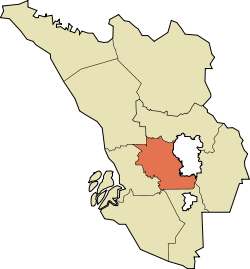Petaling District
| Petaling District | |
|---|---|
| District of Selangor | |
 |
|
| Country |
|
| State |
|
| Seat | Subang Jaya |
| Government | |
| • Sultan's Representative | Emran Kadir |
| • District Officer | Mohd. Misri Idris |
| Area | |
| • Total | 484.32 km2 (187.00 sq mi) |
| Population (2010) | |
| • Total | 1,782,375 |
| • Density | 3,700/km2 (9,500/sq mi) |
| Postcode | 40xxx 43xxx 46xxx 47xxx |
| Calling code | +6-03-5, +6-03-6, +6-03-7, +6-03-8 |
| Vehicle registration | B |
| Website | www.selangor.gov.my/petaling (Malay) |
The Petaling District is a district (daerah in Malay) located in the state of Selangor in Malaysia, not to be confused with the city of Petaling Jaya located in it, nor the subdistrict (mukim) of Petaling within Majlis Perbandaran Subang Jaya within Petaling district.
The district of Petaling was established on 1 February 1974, the same day Kuala Lumpur was declared a Federal Territory. This district is located in the middle of the Klang Valley adjacent the capital, and thus has experienced tremendous urbanization. During the 1991 census, it recorded 633,165 people. In the official 2010 census, it recorded 1,782,375 people. It covers some 484.32 km² in area. The urban centres are divided into the cities of Shah Alam and Petaling Jaya and the town of Subang Jaya (district capital). However, there are numerous town subdivisions, old subdistrict administrations (mukim), all of which share the same names like Damansara, Subang, and Petaling, which add much to the administrative confusion along with the rapid growth. Some five types of subdivisions exist for Petaling District, namely the re-organized municipal council majlis, the majlis subdivisions, the community names (a.k.a. townships), electoral constituencies, and the subdivisions ("mukim").
It is host to many thriving townships such as the Damansara area, which hosts several shopping malls including a Tesco outlet, and the largest IKEA outlet in Southeast Asia. Sultan Abdul Aziz Shah Airport is situated in Subang.
The district office is located in Subang.
The district is further divided into 4 mukim (district subdivisions). However, this definition is for historic administrative purpose only and does not reflect modern rapid growth and subsequent reorganization in 1997.
...
Wikipedia
